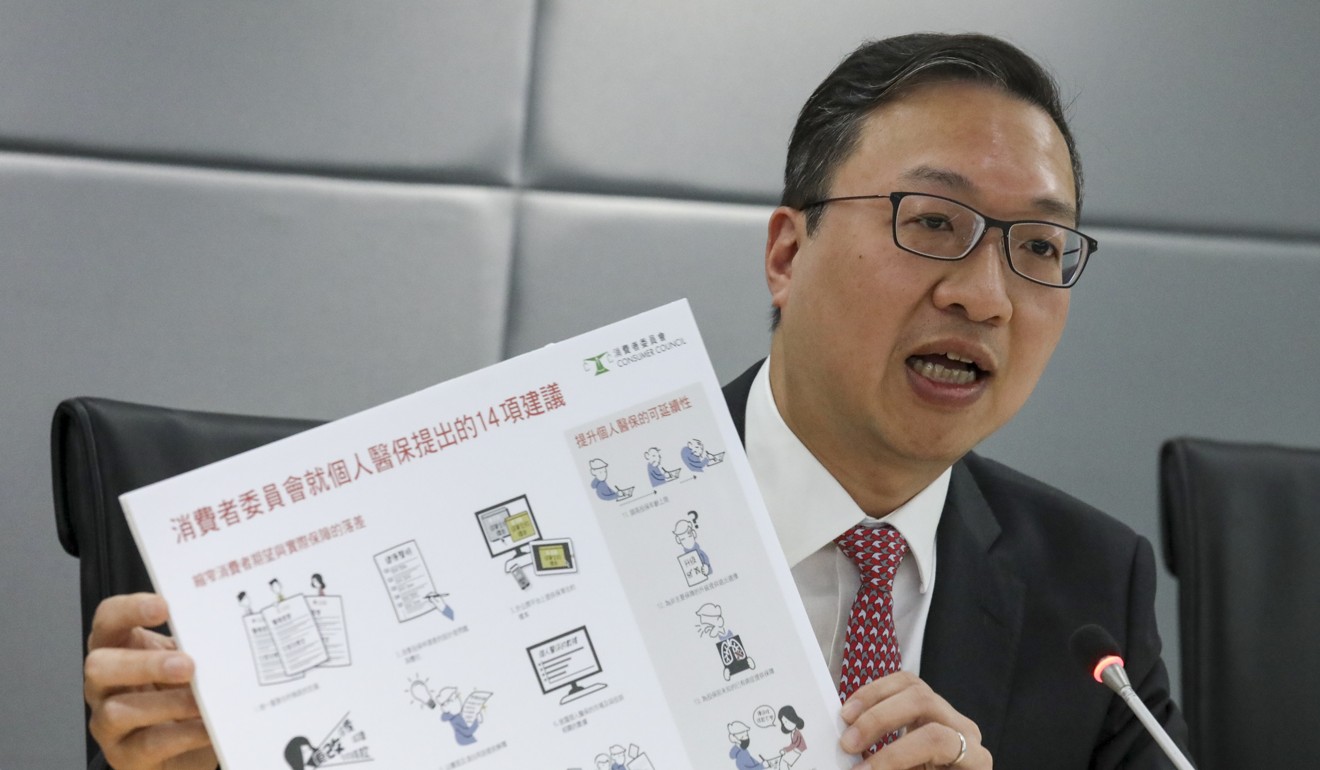
Hong Kong public hospitals under pressure as Consumer Council study reveals scale of patients with private medical insurance being treated under state system
- Private health cover is surging, but survey shows fears over disputed claims and poor coverage mean policy holders seek treatment at public hospitals
- State-funded hospitals already overstretched amid ageing population and increasing demand
More than 40 per cent of Hongkongers were treated in the city’s public hospitals despite having private health insurance because of patients’ concerns over their policies, a consumer watchdog has found.
A Consumer Council survey revealed residents would rather use services provided by the state, which are under heavy strain, than use their medical cover, for fear of being caught up in disputed claims and inadequate benefit coverage.
It has led the watchdog to issue 14 recommendations to better regulate the private industry and relieve pressure on the overloaded public healthcare system, such as providing pre-authorisation services for non-urgent treatments and offering coverage for unknown pre-existing conditions.

The council released the study on Wednesday, which included a telephone survey on 1,000 respondents aged 18 and above and a street survey of 205 consumers, who had made claims within the past 30 months.
The study, conducted between May 2016 and October 2018, also held in-depth interviews with 28 consumers who encountered difficulties with private insurance, as well as a review of relevant complaints received by the council.
It also reviewed contract samples of 18 private health insurance plans of 14 companies in Hong Kong.
Paul Lam Ting-kwok, chairman of the Consumer Council, said while the number of people covered by private health insurance had surged by 78 per cent over 10 years to 2.4 million in 2016, 43 per cent of this group still sought treatment in public hospitals instead of through private channels.
“That seems to suggest there is a lack of confidence or trust in the policies,” he said.
“There is a common impression that even if [consumers] go to private hospitals, they will not be able to get a full indemnity of the amount they have incurred.”
Other commonly identified shortcomings of those policies included disputes with the provider over claims, the exclusion of pre-existing medical conditions and a lack of continuity of policies, Lam said.
This sense of dissatisfaction is reflected in the council’s 299 complaints received between 2015 and 2018, and 748 by the Insurance Complaints Bureau in the same period.

Antonio Kwong Cho-sing, chairman for the council’s trade practices and consumer complaints review committee, listed some common complaints to the council as price disputes such as premium increases (65 cases from 2015 to 2018), application of policy terms (35), non-disclosure (25) and excluded items (24).
One of the cases involved a 67-year-old man who saw his policy’s annual premium more than double from 2013 to 2017, to HK$42,880 (US$5,463) after he was informed by the insurance company the terms would change to offer enhanced coverage.
“This is outrageous because this is not a suitable policy for me anymore and I do not have a chance to say no to the policy [changes upon policy renewal],” Kwong said, citing the complaint.
“The reference table shown to me was materially different from the proposed charged amount even at the progressive rates taking into account inflation and age.”
The latest study also found the upper age limit was commonly set at between 64 and 70 years old, definitions of key policy terms such as “medically necessary” varied among contracts of the same and different companies, and companies reserved the right to make unilateral variations, such as revisions on the terms and premiums.
Last month, the government launched a voluntary health insurance scheme accrediting private policies that meet the basic requirements, with the aim to increase the take-up of private insurance and ease the burden on the overloaded public sector.
The Food and Health Bureau noted the scheme, which aims to raise the standards of policies with insufficient coverage, has signed up most of the major insurance companies, that already provide 86 per cent of existing market coverage.
The council’s chief executive Gilly Wong Fung-han said the scheme is taking the lead to improve problems such as lack of transparency and continuity.
For example, she pointed to the scheme’s extension of the application age to the age of 80, no re-underwriting, transparency of premium information and coverage of unknown pre-existing conditions.
A bureau spokesman said it had been working closely with the council to protect the interests of consumers and will continue to also do so for work related to the voluntary health insurance scheme.
Hong Kong is facing a silver tsunami with almost one in three projected to be aged 65 or above by 2036.
Life expectancy at birth for males and females was 82 years and 88 years respectively in 2017.
A University of Hong Kong study, released in 2016, also predicted that the number of inpatient days will total 14.77 million in 2041, up from 8.21 million in 2012, adding further strain to the stretched public hospitals.
In response, the council came up with 14 recommendations after reviewing measures in six countries including Singapore, Australia and UK, to better protect consumers and eventually promote the usage of private health services.
These include extending the entry age limit, offering opt-out options for non-core benefits enhancements, providing coverage for unknown pre-existing conditions and pre-authorisation services to elective or non-urgent treatments.
The council also called for standardisation of key policy terms, improving the design of application forms to minimise possible disputes from non-disclosure, enhancing transparency on changing of policy terms, benefits and premiums, and having no, or enhancing transparency, of re-underwriting.

